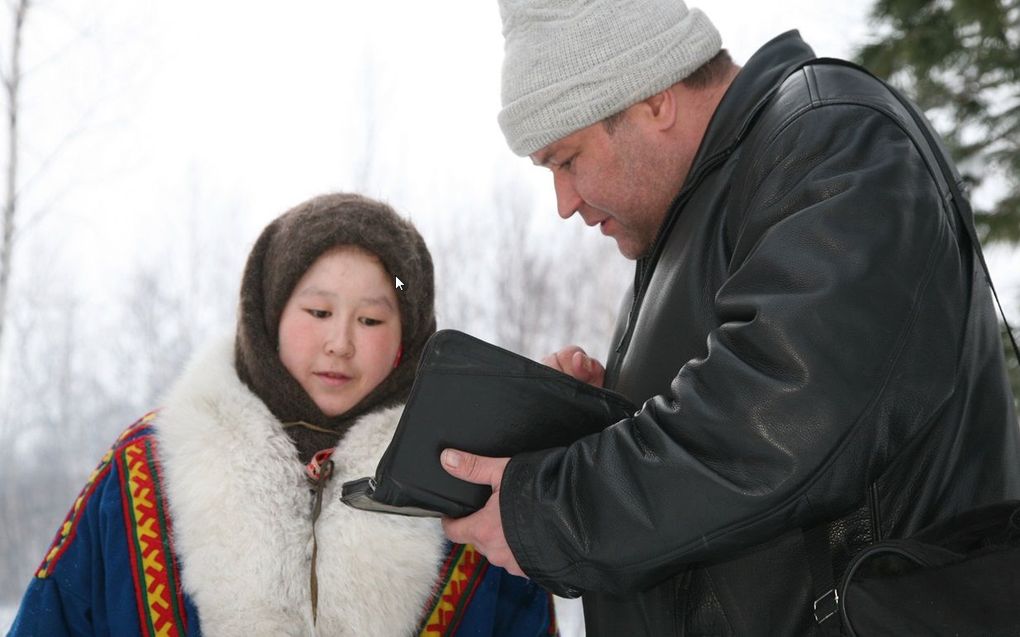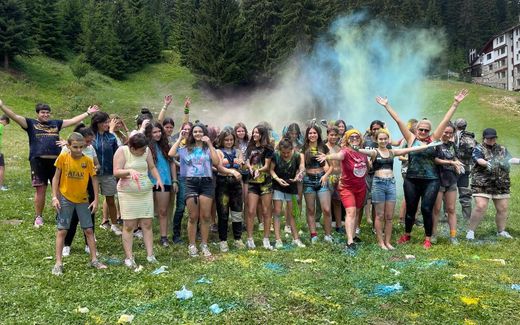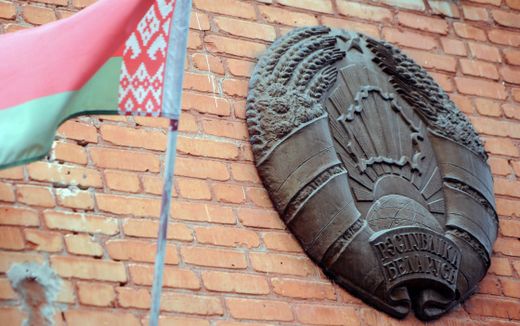War makes mission work in Russia harder
24-12-2022
Eastern Europe
Juditte Bos-ten Hove, RD

Evangelist reading from the Bible. Photo Facebook, Friedensstimme
Eastern Europe
Has the work of Christian organisations in Russia become more difficult since the war? TWR, Friedensstimme Foundation and Charité Foundation have been working there for years. How has the war between Russia and Ukraine changed their work?
Trans World Radio's (TWR) radio broadcasts in Russia have become "even more sensitive" since the war than before, says Hubrecht Smits, director of TWR. "Recently, a broadcast was refused because it was said to be too Christian."
TWR brings the Gospel to "unreached people" through the media, including radio, Smits says. "Since the war, we have listened closely to what can and cannot be broadcast. For instance, it is an offence if you call the situation in Ukraine war. Then you will even be prosecuted by authorities. But we do address themes such as grief, worry, fear and uncertainty. That's how we connect to the war situation. We continue to find ways to broadcast our programmes."
Superficial
TWR has to be very careful in how it formulates the biblical message. "Our team has to weigh every word. It is a tension to share the Gospel without scrapping our broadcasts. At the same time, we don't want to be superficial."
For instance, the organisation cannot ask people to believe in Jesus Christ. "Nor are we allowed to invite people to go to church. However, we may tell people what the Bible says. So that's what we do."
Other noticeable consequences for TWR relate to the sanctions in place. "We can no longer transfer money to Russia. We have had to think of other ways to do that."
Tense
Conscription also plays a role in the continuation of work. "Employees of TWR and people around them may be called up for conscription. This causes people to be tense; their minds are not always on the job. In addition, we are missing team members who played an important role because of the mobilisation."
Nevertheless, the work continues unabated. "There is even more and better listening to our broadcasts since the war. Because of the tension in society, there is more openness to the Word of God."
Hard to stay in touch
Keeping contact with evangelists in Russia has become "a lot more difficult", says Geert-Jan Noorman, director of the Friedensstimme foundation. "We can no longer visit them. Mail often doesn't arrive either."
Friedensstimme supports 120 evangelists in eastern regions of Russia. "We provide their livelihoods. We also send them Bibles and Christian reading material."
Around Christmas and Easter, Friedensstimme usually organises a reading event. Thousands of Bibles, calendars and other evangelisation materials arrive at the Russian evangelist's. They then distribute them in their areas. "This action will not take place at Christmas. Even at Easter, the implementation will probably be difficult."
Welfare
By plane, you can reach the capital Moscow from the Netherlands within three hours, Noorman said. "A year ago, we regularly flew to Moscow. Then we mainly chatted about the welfare of the evangelists. But especially now in wartime, they are afraid that the government is reading online messages or listening along over the phone. That is why we are reluctant to maintain contact. We prefer to speak to them face to face. Now that is not possible in Russia. Therefore, we will soon have a meeting in a Central Asian country. There we will meet some contacts."
Friedensstimme receives no signals that donors are less sympathetic to its work because Russia started a war. "Our supporters know that Russia needs the Gospel. The donation flow, fortunately, remains the same."
Nationalities
Noorman prefers not to speak out about the war. "We stay away from that. Sometimes there is something small in our newsletter. But what matters to us is how the Gospel touches Russians. We want to share those stories.
The Russians ask us to pray to the Lord to prevent a schism in their congregations. The biggest threat in Russia at the moment is that residents will start identifying themselves as either Russians or Ukrainians, they tell us. Many Ukrainians are living in Russia. The divide between the two nationalities runs through the congregations. Yet Russian congregation members say they emphasise that they are all brothers and sisters."
Belarussian mission work struggles
No more trucks leaving for Belarus full of materials: the work of the Charité Foundation is mainly at a standstill.
The interdenominational organisation is committed to "the welfare of the other" in Belarus. "But since the war between Russia and Ukraine, the foundation has been struggling," says Anke van Vlastuin, secretary and translator at Charité.
Belarus has almost the same sanctions as Russia, although it is not formally at war with Ukraine, Van Vlastuin said.
"As a Westerner, this prevents you from entering the country. Before the war, this was already not possible because of corona and nationwide political unrest. The political situation and EU embargoes on aid shipments make it very difficult for us to travel into the country. This obviously limits our work enormously."
Renovation
The foundation previously provided humanitarian aid by renovating a hospital or a children's home. "We also normally support churches financially. But this too is hardly possible anymore because of the sanctions caused by the war."
The Charité secretary explains that transferring money was difficult even before the war. The organisation cannot always reach the bank account of congregations directly, as they are not registered. Therefore, Charité must find creative ways of transferring the money.
Difficulty
But beyond that, no meeting occurs between the Dutch volunteers and the contacts from Belarus. "Yet we don't notice that they experience much difficulty with that. They can handle adversity well because they firmly believe their lives are in God's hands."
What Van Vlastuin finds difficult is that Ukraine, Russia and Belarus "actually always" formed a trinity. "The denomination of unregistered Baptist churches stretches across these three countries. Among them, people preach together and marry. For example, I spoke to a pastor from Belarus whose son-in-law is a pastor in Kyiv. Now that unity is being broken."
"We hope our work will continue. But if the war is over, that does not mean all sanctions will be lifted."
Related Articles







